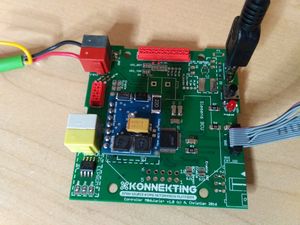Difference between revisions of "M0dularis+"
Jump to navigation
Jump to search
Konnekting (talk | contribs) |
Konnekting (talk | contribs) |
||
| Line 60: | Line 60: | ||
| | | | ||
| | | | ||
| − | | | + | |SJ: 3.3V or 5V |
| style="background-color: red;"|VCC | | style="background-color: red;"|VCC | ||
|3 | |3 | ||
| Line 78: | Line 78: | ||
|6 | |6 | ||
| style="background-color: limegreen;"|IO3 | | style="background-color: limegreen;"|IO3 | ||
| − | |SJ: PA19/D12 | + | |SJ: PA19/D12 or PA02/A0 |
|MISO1 | |MISO1 | ||
|RX1 | |RX1 | ||
| Line 91: | Line 91: | ||
|8 | |8 | ||
| style="background-color: lightblue;"|ExtINT Application / IO2 | | style="background-color: lightblue;"|ExtINT Application / IO2 | ||
| − | |SJ: PA18/D10 | + | |SJ: PA18/D10 or PB09/A2 |
|SS1 | |SS1 | ||
|TX1 | |TX1 | ||
Revision as of 11:23, 26 February 2018
| M0dularis M+ | |
|---|---|
| Developer | Alexander Christian |
| Status/Current Version | Version 1.0 already works |
| µC | Atmel/Microchip SAMD21G18J |
| KNX | Siemens BCU / Micro BCU |
Description
Controller-Board, mainly designed for OKW 4TE REG case, but also useable with anything else that fits. Can be used with Siemens BCU and Eugen's µBCU. Uses the powerful SAMD21 microcontroller from Microchip/Atmel and has optional I²C EEPROM and SPI Flash.
Hardware
Application Connector
| Description | Pin | Pin | Description | ||||||||
|---|---|---|---|---|---|---|---|---|---|---|---|
| GND / KNX GND | 1 | 2 | GND from 24V Input | ||||||||
| SJ: 3.3V or 5V | VCC | 3 | 4 | 24V from 24V Input | |||||||
| TX3 | PA22 / SDA | SDA / IO0 | 5 | 6 | IO3 | SJ: PA19/D12 or PA02/A0 | MISO1 | RX1 | |||
| RX3 | PA23 / SCL | SCL / IO1 | 7 | 8 | ExtINT Application / IO2 | SJ: PA18/D10 or PB09/A2 | SS1 | TX1 | |||
| SDA2 | RX2 | MISO2 | PA09 / D3 | Option0 | 9 | 10 | Option7 | PA17 / D13 | SCK1 | RX1 | SCL1 |
| SCL2 | TX2 | MOSI2 | PA08 / D4 | Option1 | 11 | 12 | Option6 | PA16 / D11 | MOSI1 | TX1 | SDA1 |
| SCK2 | PA15 / D5 | Option2 | 13 | 14 | Option5 | PA20 / D6 | |||||
| SS2 | PA14 / D2 | Option3 | 15 | 16 | Option4 | PA21 / D7 |
You can decide via solder-jumper:
- IO3: D12 or A0
- IO2: D10 or A2
- Application connector: 5V or 3.3V
- Frontend connector: 5V or 3.3V
- I2C (on IO0/IO1): PullUp or NoPullUp
OnBoard Connections
- ProgButton*: D15 / A1 [EIC8]
- ProgLED: D19 / A5
- BCU Save*: D17 / A3 [EIC4]
- BCU Reset*: Solder jumper for connecting SAMD-RESET and BCU-RESET Pin
- ExtInt TOP*: D38 [EIC13]
- SPI Flash
- CS: D9
- DO/IO1: PA12 / D22 MISO
- DI/IO0: PB10 / D23 MOSI
- CLK: PB11 / D24 SCK
\* = PWM capable
Software
How to use SPI Flash
I recommend to use this SPI Flash Library: https://github.com/Marzogh/SPIFlash
You need to explicitly tell the library the CS-Pin:
1// set CS pin to D9
2SPIFlash flash(9);
For testing, you can use https://github.com/Marzogh/SPIFlash/tree/development/examples/TestFlash and modify the said line to use the custom CS pin D9.
